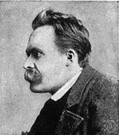Nie·tzsche
(nē′chə, -chē), Friedrich Wilhelm 1844-1900. German philosopher who argued that Christianity's emphasis on the afterlife makes its believers less able to cope with earthly life. He suggested that the ideal human, the Übermensch, would be able to channel passions creatively instead of suppressing them. His written works include Beyond Good and Evil (1886) and Thus Spake Zarathustra (1883-1892).
Nie′tzsche·an adj. & n.
American Heritage® Dictionary of the English Language, Fifth Edition. Copyright © 2016 by Houghton Mifflin Harcourt Publishing Company. Published by Houghton Mifflin Harcourt Publishing Company. All rights reserved.
Nietzsche
(ˈniːtʃə)n
(Biography) Friedrich Wilhelm (ˈfriːdrɪç ˈvɪlhɛlm). 1844–1900, German philosopher, poet, and critic, noted esp for his concept of the superman and his rejection of traditional Christian values. His chief works are The Birth of Tragedy (1872), Thus Spake Zarathustra (1883–91), and Beyond Good and Evil (1886)
Nietzschean n, adj
ˈNietzscheˌism, ˈNietzscheanˌism n
Collins English Dictionary – Complete and Unabridged, 12th Edition 2014 © HarperCollins Publishers 1991, 1994, 1998, 2000, 2003, 2006, 2007, 2009, 2011, 2014
Nie•tzsche
(ˈni tʃə, -tʃi)n.
Friedrich Wilhelm, 1844–1900, German philosopher.
Random House Kernerman Webster's College Dictionary, © 2010 K Dictionaries Ltd. Copyright 2005, 1997, 1991 by Random House, Inc. All rights reserved.
ThesaurusAntonymsRelated WordsSynonymsLegend:
| Noun | 1. |  Nietzsche - influential German philosopher remembered for his concept of the superman and for his rejection of Christian values; considered, along with Kierkegaard, to be a founder of existentialism (1844-1900) Nietzsche - influential German philosopher remembered for his concept of the superman and for his rejection of Christian values; considered, along with Kierkegaard, to be a founder of existentialism (1844-1900) |
Based on WordNet 3.0, Farlex clipart collection. © 2003-2012 Princeton University, Farlex Inc.